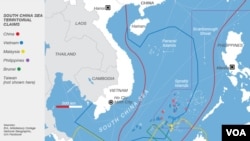MANILA —
An international court is giving Beijing more time to defend its territorial claims in the South China Sea. But China has refused to participate in the arbitration case brought by the Philippines to clarify their territorial claims.
The Permanent Court of Arbitration in The Hague says Beijing has until December 15th to submit arguments to the arbitral panel handling the Philippines case against China. But in a statement the court said it received a note from China stating “it does not accept the arbitration initiated by the Philippines.”
The court also said China made clear the diplomatic response does not mean it is accepting nor participating in the proceedings.
Philippine Foreign Affairs Spokesman Charles Jose says the department is imploring China to reconsider its decision not to take part.
“We continue to urge them to participate in the arbitration so that they will be able to clarify their claim as represented in the nine-dash line,” he said.
The Philippines calls China’s claims in the resource-rich South China Sea “excessive.” Some maps demarcate Beijing’s claim to practically the entire sea with nine dashes in a tongue-shaped swath. Manila questions Beijing’s claims to outcroppings that it says are well within the Philippines’ exclusive economic zone.
Brunei, Malaysia, Taiwan and Vietnam also have claims in waters, which are rich with sea life, hold potentially vast hydrocarbon reserves and are a major trade route.
Oil rig issue
In recent weeks, Vietnamese and Chinese vessels have clashed in waters off the Paracel Islands where a Chinese oil rig is drilling. The United States has said China has “undertaken destabilizing” actions in asserting its claims.
U.S. Commerce Secretary Penny Pritzker traveling in the Philippines Wednesday said the Chinese oil rig being escorted by government vessels was “provocative” and could be a hindrance on business. But she also said the “remarkable growth” of the Philippine economy and that of others around the region provides untapped potential for investment.
In a keynote address to Philippine and American business leaders in Manila, Pritzker reiterated the U.S. “commitment [to the Asia-Pacific region] remains steadfast.”
“Our pledge is to partner with you and the many dynamic nations of the Asia-Pacific to build on your economic progress and to bring greater prosperity to millions across the region, in the United States and throughout the world,” she said.
The Philippines is the second stop in Pritzker’s three-state visit, which also includes Vietnam and Burma.
The U.S. is looking to strengthen ties with its allies in the region with a focus on security, economic and political fronts as China’s influence grows.
In late April, the U.S. and the Philippines signed an agreement to have more American troop rotations, joint military exercises and prepositioned American material in the country. The Philippines sees this as a way to boost its minimum credible defense posture in the face of its ongoing dispute with China.
The Permanent Court of Arbitration in The Hague says Beijing has until December 15th to submit arguments to the arbitral panel handling the Philippines case against China. But in a statement the court said it received a note from China stating “it does not accept the arbitration initiated by the Philippines.”
The court also said China made clear the diplomatic response does not mean it is accepting nor participating in the proceedings.
Philippine Foreign Affairs Spokesman Charles Jose says the department is imploring China to reconsider its decision not to take part.
“We continue to urge them to participate in the arbitration so that they will be able to clarify their claim as represented in the nine-dash line,” he said.
The Philippines calls China’s claims in the resource-rich South China Sea “excessive.” Some maps demarcate Beijing’s claim to practically the entire sea with nine dashes in a tongue-shaped swath. Manila questions Beijing’s claims to outcroppings that it says are well within the Philippines’ exclusive economic zone.
Brunei, Malaysia, Taiwan and Vietnam also have claims in waters, which are rich with sea life, hold potentially vast hydrocarbon reserves and are a major trade route.
Oil rig issue
In recent weeks, Vietnamese and Chinese vessels have clashed in waters off the Paracel Islands where a Chinese oil rig is drilling. The United States has said China has “undertaken destabilizing” actions in asserting its claims.
U.S. Commerce Secretary Penny Pritzker traveling in the Philippines Wednesday said the Chinese oil rig being escorted by government vessels was “provocative” and could be a hindrance on business. But she also said the “remarkable growth” of the Philippine economy and that of others around the region provides untapped potential for investment.
In a keynote address to Philippine and American business leaders in Manila, Pritzker reiterated the U.S. “commitment [to the Asia-Pacific region] remains steadfast.”
“Our pledge is to partner with you and the many dynamic nations of the Asia-Pacific to build on your economic progress and to bring greater prosperity to millions across the region, in the United States and throughout the world,” she said.
The Philippines is the second stop in Pritzker’s three-state visit, which also includes Vietnam and Burma.
The U.S. is looking to strengthen ties with its allies in the region with a focus on security, economic and political fronts as China’s influence grows.
In late April, the U.S. and the Philippines signed an agreement to have more American troop rotations, joint military exercises and prepositioned American material in the country. The Philippines sees this as a way to boost its minimum credible defense posture in the face of its ongoing dispute with China.





